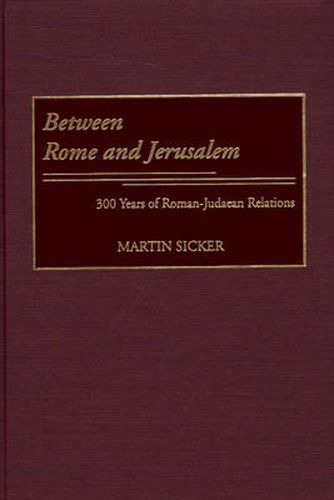Readings Newsletter
Become a Readings Member to make your shopping experience even easier.
Sign in or sign up for free!
You’re not far away from qualifying for FREE standard shipping within Australia
You’ve qualified for FREE standard shipping within Australia
The cart is loading…






Sicker sheds new light on the political circumstances surrounding the emergence of Rabbinic Judaism and Christianity. He places the 300-year history of Judaea from the Hasmoneans to Bar Kokhba, 167 B.C.E.-135 C.E. in the context of Roman history and Judaea’s geostrategic role in Rome’s geopolitics in the Middle East.
However, because of the unique character of its religion and culture, which bred an intense nationalism unknown elsewhere in the ancient world, Judaea turned out to be a weak link holding the Roman Empire in the east together. As such, it became a factor of some importance in the protracted struggle of Rome and Parthia for hegemony in southwest Asia. Judaea thus took on a political and strategic significance that was grossly disproportionate to its size and made its subjugation and domination an imperative of Roman foreign policy for two centuries, from Pompeius to Hadrian. In effect, the history of the period may be viewed as the story of the conflict between Roman imperialism and Judaean nationalism. A fresh look at ancient Middle Eastern and Roman history that will be invaluable for students and scholars of ancient history, post-biblical Jewish history and of Christian origins.
$9.00 standard shipping within Australia
FREE standard shipping within Australia for orders over $100.00
Express & International shipping calculated at checkout
Sicker sheds new light on the political circumstances surrounding the emergence of Rabbinic Judaism and Christianity. He places the 300-year history of Judaea from the Hasmoneans to Bar Kokhba, 167 B.C.E.-135 C.E. in the context of Roman history and Judaea’s geostrategic role in Rome’s geopolitics in the Middle East.
However, because of the unique character of its religion and culture, which bred an intense nationalism unknown elsewhere in the ancient world, Judaea turned out to be a weak link holding the Roman Empire in the east together. As such, it became a factor of some importance in the protracted struggle of Rome and Parthia for hegemony in southwest Asia. Judaea thus took on a political and strategic significance that was grossly disproportionate to its size and made its subjugation and domination an imperative of Roman foreign policy for two centuries, from Pompeius to Hadrian. In effect, the history of the period may be viewed as the story of the conflict between Roman imperialism and Judaean nationalism. A fresh look at ancient Middle Eastern and Roman history that will be invaluable for students and scholars of ancient history, post-biblical Jewish history and of Christian origins.